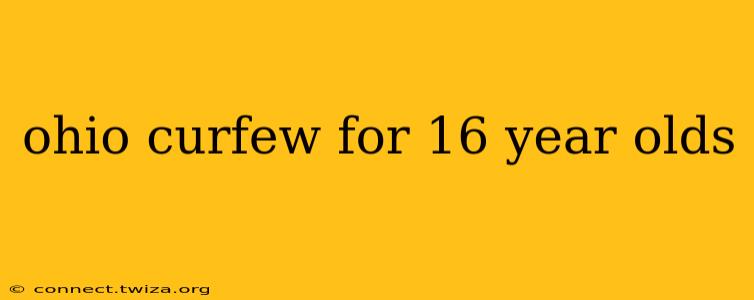Ohio doesn't have a statewide curfew specifically targeting 16-year-olds. Instead, individual cities and counties have the authority to establish their own local curfews. This means the curfew for a 16-year-old in Cincinnati will likely be different than the curfew in Cleveland or a rural county. This lack of uniformity can be confusing, so understanding the nuances is crucial for both parents and teenagers.
This guide will clarify the situation surrounding curfews for 16-year-olds in Ohio, addressing common questions and offering advice on navigating this complex legal landscape.
What is the curfew for 16-year-olds in Ohio?
There's no single answer to this question. Ohio does not have a state-level curfew for minors. This means the curfew, if any, is determined by the local municipality (city or county) where the 16-year-old resides. Some areas may not have a curfew at all, while others may impose restrictions on minors under the age of 18. To find the specific curfew for a particular location, you should check the city or county's official website or contact the local police department.
How can I find the curfew for my city or county?
The easiest way to determine your local curfew is to:
- Visit your city or county's official website: Look for sections on "ordinances," "laws," "codes," or "municipal code." The curfew information, if it exists, will often be found within these sections.
- Contact your local police department: They are the best resource for accurate and up-to-date information on local ordinances, including curfews.
Are there exceptions to the curfew?
Even if a curfew exists in your area, there are usually exceptions. These might include:
- Working: Minors working late shifts will generally be exempt from curfew restrictions.
- Accompanied by a parent or guardian: Being with an adult responsible for their well-being usually negates curfew violations.
- Emergency situations: Curfews are generally not enforced during emergencies or when a minor is involved in an emergency situation.
- Participating in school or extracurricular activities: Legitimate participation in school-related activities will often be considered an acceptable reason to be out past curfew.
Always check the specific language of your local ordinance to understand the allowed exceptions fully.
What are the penalties for violating curfew?
The consequences for violating a local curfew vary depending on the municipality. Penalties could range from a warning to fines and even possible detention for repeat offenders. Parents may also face penalties in some jurisdictions.
What if my 16-year-old is stopped by the police for curfew violation?
If a 16-year-old is stopped by the police for a suspected curfew violation, it's essential to remain calm and cooperative. They should be polite and provide their identification. The police will likely verify their identity and address the situation based on the local ordinance and any applicable exceptions.
Does Ohio have a curfew for driving 16-year-olds?
Ohio has specific laws regarding driving permits and licenses for minors. These laws dictate driving restrictions, not necessarily curfews. However, violating driving restrictions can lead to penalties, including suspension of driving privileges. These restrictions are distinct from municipal curfews.
This information is for guidance only and should not be considered legal advice. Always consult with local authorities or a legal professional for definitive information concerning curfews in your specific area. Remember, knowing and understanding your local laws is the best way to ensure compliance and avoid any potential issues.
